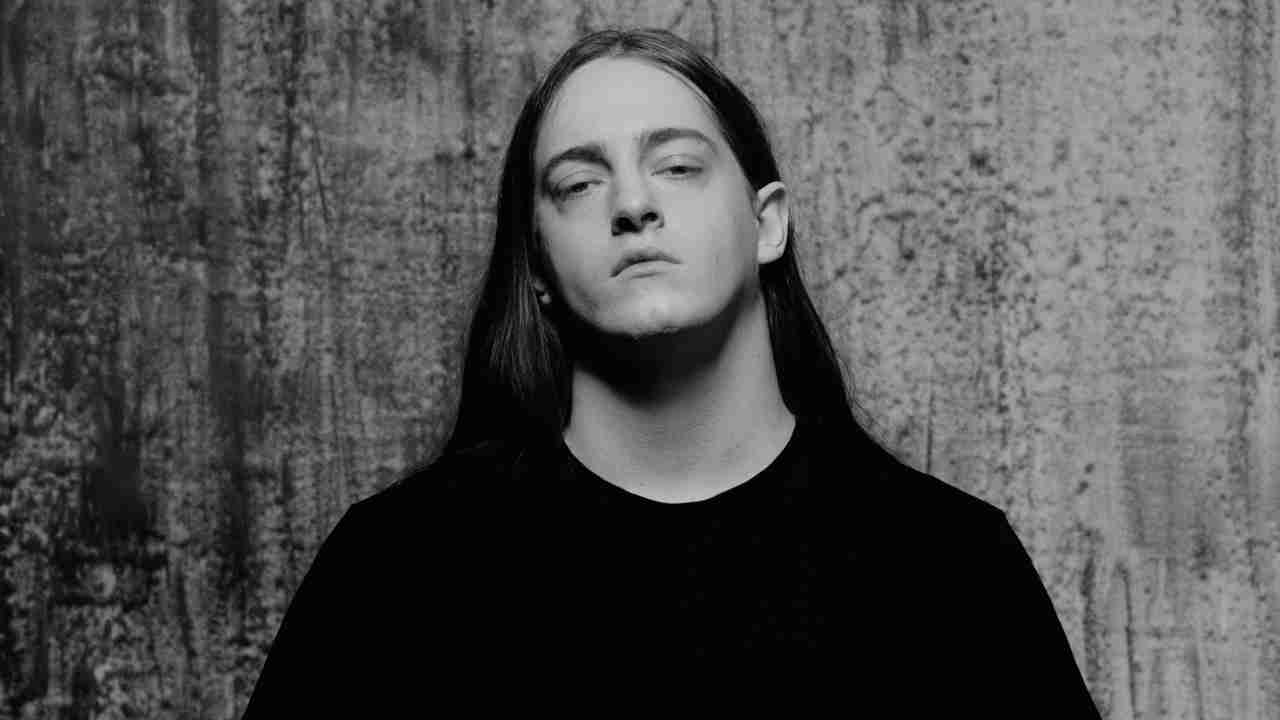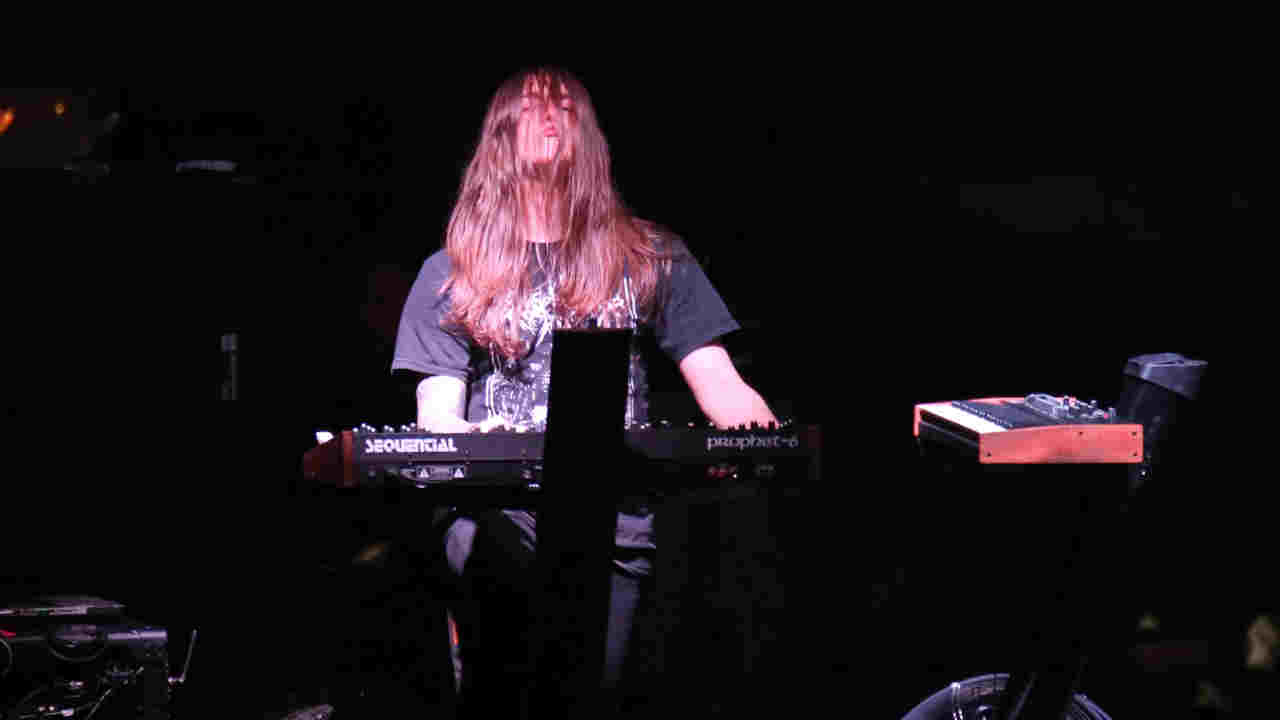By the end of summer 2017, James Kent had reached a fork in his neon-paved road. That year, the Parisian producer had hit the metal festival circuit across Europe, working glowstick-waving metalheads into a frenzy with his lurid synthwave project, Perturbator. Along with scene mates Carpenter Brut and Gost, he’d turned electronic nostalgia into big business in metal – one of the more surprising phenomena Hammer has witnessed. But behind the thundering beats and 80s Day-Glo imagery, the adrenaline rush was wearing off. James was bored.
“You can see these synths being put into everything,” he complained to Hammer later that year, pointing out that between the numerous retro acts jumping on the bandwagon, and the 80s aesthetic cropping up in everything from Thor: Ragnarok to Blade Runner 2049 and Stranger Things, synthwave was nearing saturation point. Looking back on previous conversations with James, you can see why this would be a problem. Intense and uncompromising, he’s always taken his music seriously, revelling in his role as an outsider and enjoying his position as an artist falling between synthwave and metal.
Fearing the scene he was spear- heading had become a “gimmick”, in September 2017 he dropped the EP New Model, which eschewed the neon highway for a sinister, industrial landscape that stretched out towards a dark horizon.
“I think I had said everything I could have said with synthwave,” he says today, from his home in the Parisian suburbs. “There’s only so many albums you can make trying to capture nostalgia or the same vibe. When I started New Model, I pretty much told myself, ‘Don’t try to sound like synthwave’, but I cannot completely remove it from my music. There’s always going to be this DNA of synthesisers, but it’s important to show [that] doesn’t necessarily mean 80s retro. It can be something else.”

The seeds were sown for that “something else” almost eight years ago, when James was just 20. Having grown up on a diet of thrash and death metal, he was introduced to post-punk and goth bands by his mother, French music journalist Laurence Romance, who got him into Siouxsie And The Banshees and Bauhaus. Having built his confidence by steering New Model into industrial waters, he knew straight off the bat that he wanted to create a follow-up that would carry him further away from his synthwave roots. The result is fifth album Lustful Sacraments – a gloomy, decadent and atmospheric trip inspired by classic electro-punk and industrial electronic acts such as DAF and Front 242, as well as his favourite goth and post-punk albums: The Cure’s Pornography, The Sisters Of Mercy’s Floodland and Killing Joke’s self-titled debut.
No one, least of all James, expected Perturbator’s brash brand of electronica to find a home in metal’s underground. But Lustful Sacraments feels like a natural fit – something that could be filed alongside other recent reimaginings of goth’s brooding past, like Grave Pleasures’ Motherblood and Mana by Unto Others (formerly Idle Hands).
“This is something I always wanted to do, but I didn’t have the skills to do it,” he admits. “It involves more than synthesisers; there’s a lot of guitars in the album and a lot of vocals. This is the album I always wanted to make in a way, but it was only in 2017 [following the release of New Model] when I decided, ‘OK, now I am ready to make this album. I can make this sound good now and it’s not going to be clumsy.”
Although James started writing immediately after releasing New Model, he toured throughout 2018 and 2019, so three years passed without any recording. But as Covid-19 hit in 2020, and France went into lockdown, he found himself with the time and head- space to get stuck in. The album came together quickly in a matter of months, James laying down all the electronics and guitars at his home studio.
“At first I wanted to sing on the album, like really sing,” he says. “But I quickly noticed that after a bunch of failed attempts that I’m not a very good singer. So I thought, pardon my French, ‘Well, fuck me, I’m not going to be able to do it, I’m not going to be able to finish the album. [Then] I realised there’s a lot of bands like Joy Division that just talk, so thought I could talk on the album and not have to do harmonies and be a good singer. That kind of works and it fits the vibe I was going for.”
Post-punk’s uneasy charm comes from its imperfections, and it’s that rawness that Lustful Sacraments taps into so effectively. A world away from the over-saturated gleam of his earlier material, tracks such as Excess and The Other Place are seductively melancholic – an invitation into a mysterious and lawless corner of the dancefloor. Elsewhere, James’s long-time inspirations – 80s exploitation movies, slasher flicks and John Carpenter horror scores – loom over tracks like fiendish single Death Of A Soul. There’s even a moment in the song’s video where liquid spurts from inside a casino slot machine, like blood pouring from the Overlook Hotel elevators in Stanley Kubrick’s The Shining.
“This album is about bad habits, dissatisfaction and addiction,” explains James. “An overall look at how we, as a species, lean towards self-destruction. It is set in a fictitious city called Xanadu where nothing is forbidden and everything is free. People party all day, every day, abuse drugs, go crazy…”
And what’s your take on that?
“I’m definitely not pointing the finger at it,” he responds, before we even finish the question. “I’m not saying it’s bad, because it’s something I do also as well, indulging in alcohol and drugs sometimes. I think it’s a very neutral stance. More like a scene from a movie, like when you see [Kubrick’s surreal 1999 thriller] Eyes Wide Shut and you’re like, ‘Is this bad or good?’ I just wanted to illicit this strange feeling of no inhibitions.”
On learning the story of excess behind the album, it’s not remotely surprising to hear it was partly inspired by Las Vegas, alongside the dark majesty of 40s and 50s film noir and, in particular, Fritz Lang’s art deco 1927 classic Metropolis, whose influence ebbs in through the album’s narrative and brassy cover art. “I don’t think I need to explain how important that movie is culturally and artistically,” says James. “The way it portrays luxury, debauchery and wealth at others’ expense, along with still-relevant questions about transhumanism and social hierarchies, is definitely something that I took inspiration from.”

Those same contradictions are what fascinates and repulses James about Las Vegas, too. He’s played the city twice, the first time in 2017, supporting none other than John Carpenter himself on his Anthology tour, during which the Master of Horror performed his classic movie scores such as Halloween and The Fog. “It’s a very strange relationship I have with Las Vegas,” explains James. “It was always a blast and I didn’t want to leave – maybe something that this album is about. But it’s a good thing I’m not staying in Vegas; I would have lost myself there.”
Is the album about his own experiences of excess and self-destruction? “Maybe in a way,” he admits carefully. “There’s definitely tracks on there that were written in a place of, ‘I fucked up, and I didn’t fuck up.’ There’s a bit of a personal take on it, but that’s too personal for me to share with the people who are going to listen to the album; I’d rather they make their own story from it. Take their own message.”
James might be coy about revealing some of the stories and experiences that have fed Lustful Sacraments, but he’s more forthcoming when we ask what the future holds for both him and his erstwhile scene. “I personally have no idea where synthwave is going,” he says dismissively. “I’m not really involved in it, to be honest. As for me, I think I need probably a little break. [Lustful Sacraments] is not the last album, it’s not going to be the end, but I’m probably going to take a little break from [Perturbator], or maybe do other projects.”
Breaking the shackles that tied him to synthwave has given James a new artistic freedom, not least the opportunity to release new material with his side band, Ruin Of Romantics. In January this year, they put out two-track single Self Control, allowing James the chance to explore a more ambient, shoegazey approach to goth, proving his creativity isn’t about to fade out like the neon glow of the synthwave scene. “If I make an album, I want to give something to people that they might not know that they liked or have discovered,” he says defiantly. “I don’t want to rehash anything.”
Published in Metal Hammer #348

